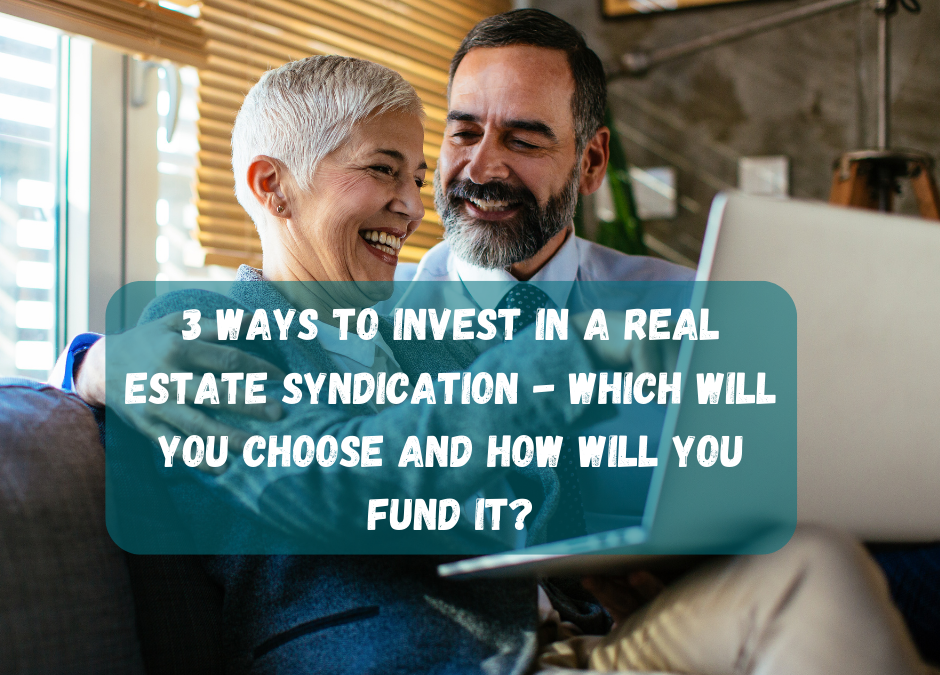There are plenty of ways to invest in real estate. However, what are 3 ways to invest in real estate syndication? As you learn about real estate syndications and decide to invest, one of the main questions you may have is about how to invest and where to get the money to fund this investment.
Passive income is great, but you have to set up your personal finances strategically so the distributions benefit you in the way you desire.
Minimum investment amounts typically range between $50-100K. Because it’s more than you will spend on your next dinner out, there’s a little bit of planning and strategy required.
There are multiple ways you can fund your investment as far as who and how you are investing as well as considerations that will need to be made regarding where the money is coming from.
The option you choose depends on your personal situation, your investing goals and more. This is an answer that only you can make but we do recommend you discuss your decision with your accountant and financial planner so you are making the best choice for your personal and financial goals as well as your taxes.
Let’s dive into 3 ways you can invest in a syndication as well as where the funds can come from.
Invest as an Individual Investor with Cash
The quickest and easiest way to invest is as an individual and to fund with cash. This means you are entering the deal as an LP (limited partner) as an individual with funds from your savings or other liquid assets. Because you are investing as an individual, you’re in control of selecting the deal, signing and completing documents on time and wiring the money in.
As an individual, you’ll receive distributions from the syndication offering directly into your bank account and reap the tax benefits of owning real estate, all while doing so passively! You don’t have to worry about bookkeeping either because you’ll receive a K1 annually (typically late Spring) with all the information you need for your taxes.
When you invest as an individual from a cash account, all the tax breaks, depreciation, distributions, and other benefits of being a real estate investor are yours – with none of the work!
If this is how you want to invest, you may want to think about asset protection including making sure there is a will in place with a designated beneficiary. The operator team doesn’t collect beneficiary information, so if something unexpected occurs, you want to have that clearly stated in your own legal documents.
Invest with Your Partner or Spouse
Another option is to invest jointly with a partner or a spouse with cash. You can pool your resources together and invest in a real estate syndication deal together. That way you can enjoy the journey and the benefits of passive investing, together!
In this scenario, two signatures are required and both of you have to agree on an investment deal together. Other than that, it’s still a pretty straightforward process. Both partners will still want to consider asset protection strategies and put legal beneficiary designations in place.
Whether this is state-determined or designated in a trust or will, it should be set up by the spouses or partners ahead of time. .
Investing as an Entity or through a Retirement Account
The third way you can invest is through an entity or retirement account. You can invest using an LLC you have set up or through a trust or retirement account like a self-directed IRA, solo 401K or qualified retirement plan (QRP).
Depending on your state’s rules and the advice of your accountant, these can be great options for you to invest in a real estate syndication. You can use retirement funds or an LLC you have set up.
Both typically require one signature, which is either the legal signer for the LLC or the trustee of the retirement account. Both options require some paperwork and a longer timeframe for the funds to be wired out, which can make things slightly more complicated. But if you plan ahead and understand the process, it should be pretty smooth sailing.
We always recommend checking with your tax professional who is familiar with your financial situation and the applicable tax laws to advise which choice may be most beneficial to you.
Distributions and any benefits from the investment apply to the entity, meaning the deposits will go back into your retirement or business account.
When investing using an entity or qualified retirement plan, your level of asset protection is based on the Operating Agreement of the LLC, Trust, or IRA you’re using. Check with your account provider about any rules or fees about real estate investments and understand the benefits of depreciation or losses (paper or otherwise) as applicable to the account. If you are investing in real estate syndications through a self-directed IRA, for example, you could become liable for UFDI or UBIT taxes. It’s definitely worth looking into.
Which Funding Option Should You Choose?
At the end of the day, the answer usually depends on when/if you need the cash flow and how you want the tax benefits to be applied.
If you want distributions and tax benefits applied to you personally and want the cash flow to provide income for your expenses now, then an individual or joint investment funded with cash may be the way to go.
If you’re more interested in building long-term growth and having the distributions bulk up your retirement account or are primarily focused on the equity on the backend of the investment, then you may want to explore a QRP, a self-directed IRA, or even a LLC.
Finding And Funding Your Next (or First) Syndication Deal
To invest in a real estate syndication,you often have to be an accredited investor. However, a handful of our syndication deals have been available to sophisticated investors over the past year.
In other words, you can take advantage of this wealth building tool at almost any level!
All you have to do is join the Ohana Investor Club which includes a quick call with me to discuss your investing goals, what you’re looking for and how you see real estate syndications moving you toward the lifestyle you desire and deserve. Then, and only then, can I share all of our upcoming offerings with you!
We look forward to walking through this investing journey with you!

